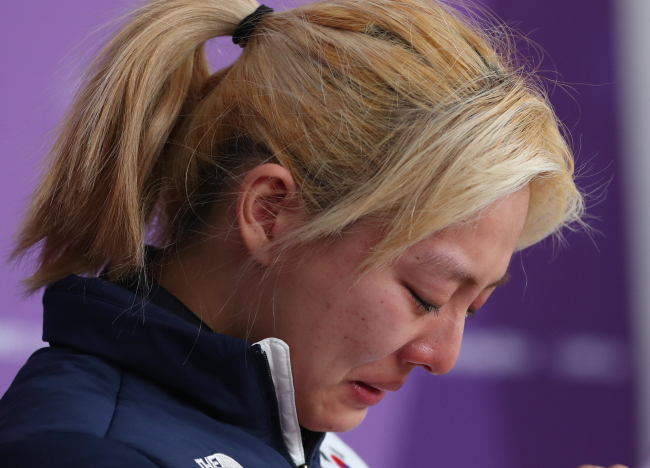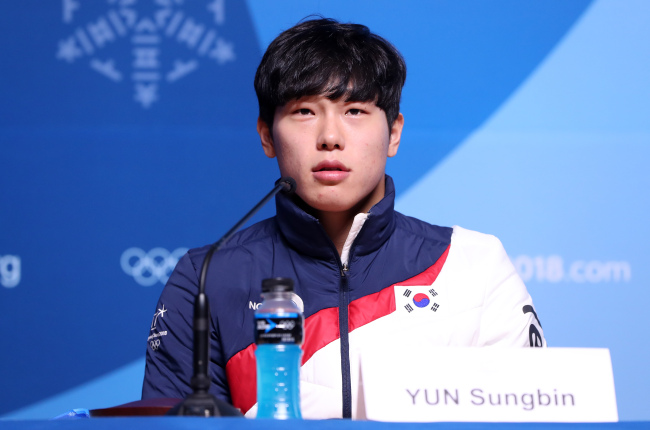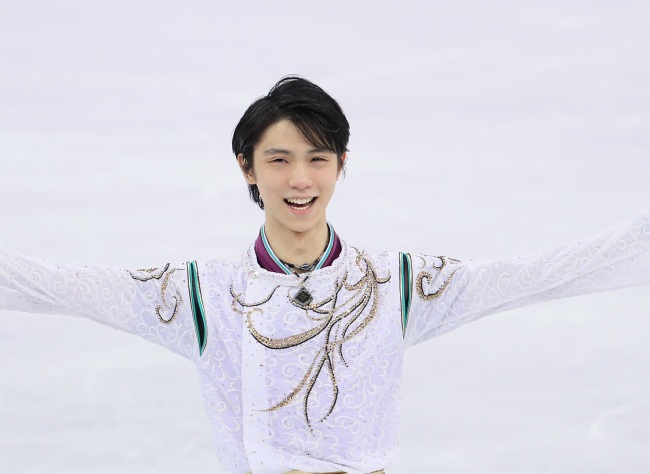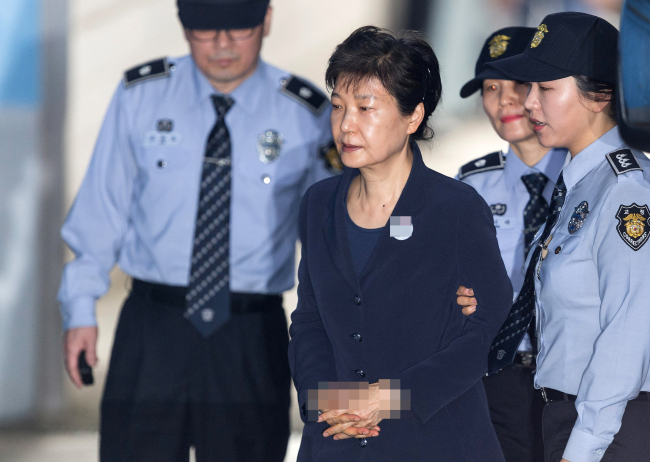At a press conference that was abruptly arranged on Tuesday evening, Kim Bo-reum, South Korea’s speed skater, offered her public apology while tears rolled down her face.
“I apologize to those who have been hurt or affected by my TV interview (regarding teammate Noh Seon-yeong),” the 25-year-old said, looking visibly shaken.
Her apology came shortly after hundreds of thousands of angry South Korean fans, believing Kim guilty of bullying her teammate, had filed a petition with the country’s presidential office to expel her from the Olympic team.
Whether Kim indeed bullied her teammate or not, the ongoing controversy has raised the issue of South Korea’s “inseong” trials, which many of the country’s celebrities and athletes have become subject to, and its potentially violent nature against vulnerable individuals.
 |
South Korean speedskater Kim Bo-reum bursts into tears as she offers an apology over her controversial TV interview at PyeongChang, Gangwon Province, Tuesday. (Yonhap) |
Roughly translated to “character” or “personality,” the Korean word “inseong” generally refers to a person’s way of treating others. A person with a bad inseong would be rude or impolite to those who are older than them, mistreat servers at restaurants and mock or humiliate others in a public space.
Kim has now been labeled as a person of “terrible inseong,” thanks to a TV interview where she blamed Noh for failing to make it to the semifinals in the women’s team pursuit. And it is because of her terrible inseong that people believe she must be expelled from the national team. It is also her bad inseong that has purportedly brought disgrace to her country in an international event like the Olympics.
Yet not all South Koreans think it was necessary for Kim to apologize in tears on national TV.
Selective targets
“I think these ‘inseong’ trials are almost becoming like a witch hunt nowadays,” said Kim Kang-jin, a 32-year-old businessman in Seoul.
“I say ‘think’ because when the general public and media talk about ‘inseong’ of others, they are always very selective. They almost never bring up the issue of inseong when they are talking about those in power, such as lawmakers in office. It’s almost always young entertainers or athletes who become the target.
“Yes, it seems to me there is a problem with Kim Bo-reum’s inseong,” said Kim, who said he watched the skater’s TV interview.
“But do I think she deserved to be criticized by more than 500,000 people who signed a petition against her sports career? No.”
Kim is not the only athlete who has faced an inseong trial. Yun Sung-bin, who became South Korea’s first Olympic skeleton champion at PyeongChang, also has been a subject of public speculation for possibly having bad inseong.
 |
Yun Sung-bin, South Korea`s first gold medalist in skeleton, has been criticised for his past social media posts. (Yonhap) |
 |
Japanese figure skater Yuzuru Hanyu also has been a subject of debate over his attitude among South Korean sports fans. (Yonhap) |
A number of South Koreans had screen-captured Yun’s social media posts that he had uploaded some five years ago where he used vulgar and often misogynistic language. His critics have accused him of having an inseong that is not ideal for an Olympic champion and newly crowned national hero.
Japanese figure skater and two-time Olympic champion Yuzuru Hanyu also has been a subject of debate among South Korean sports fans over his inseong.
According to unverified accounts from South Korean fans, Hanyu allegedly ignored a child fan who wanted to give him a painting she had created herself, as a gift, as he “only cared about” waving to the crowd on the ice following a competition a few years ago. He apparently ended up accepting the gift, but soon left it on the ice and departed the venue, leaving the child heartbroken.
None of these accounts have been confirmed to be true, but South Korean media outlets have featured them regardless during this Olympic season, with headlines such as “Yuzuru Hanyu becomes two-time Olympic champion. But what about his inseong?”
“I think this obsession with inseong in turn shows how oppressive South Korean society is,” said Park Ja-in, a 29-year-old sports fan in Seoul. “Celebrities and sports stars are almost virtually and unjustly expected to be saints. But they are just like us. No one is perfect, and no one can be.”
Impeachment and candlelight vigil
 |
Former South Korean President Park Geun-hye, who was impeached over a corruption scandal. (Yonhap) |
Some Koreans compare the ongoing petition against Kim Bo-reum with the candlelight vigil that took place leading up to the impeachment of former President Park Geun-hye, following a corruption and influence-peddling scandal.
“Everyone was holding candles to protest against Park at the time, but it was actually the society that had allowed someone like her to be the nation’s president in the first place,” said Yoon Mi-young, a sports fan in her 40s.
She claimed that it’s the top officials at the Korea Skating Union, not the young skaters, who should face criticism and even disciplinary actions.
“Criticizing the skaters as individuals won’t fix any problems in the long run. This petition against Kim does not surprise me and it only reminds me of the candlelight vigil (that only attacked Park, rather than the system).
A media critic, who did not wish to be named, said obsessing over one’s so-called inseong, rather than professional competence, can indeed easily hide the real, systematic problems the individual is involved with.
He said in South Korea’s hyper-competitive society, the collective obsession over inseong reveals how the nation’s exceptionally competent and talented individuals are being controlled and even punished by constantly being expected to be well-behaved and pleasant to others.
“During the days leading up to the impeachment, many framed Park Geun-hye as a terrible woman, rather than an incompetent President,” he said.
“In a similar context, Kim Bo-reum has been labeled as an athlete with a horrible inseong, and because of this, you can see how her caliber as a skater is now considered as totally useless and irrelevant.”
“In South Korea, you are unlikely to be recognized for your talents if your inseong does not get approved by those who have control over your future,” he added.
“And it’s important to note that inseong can mean many things, depending on whom you are talking to. For some, to have a good inseong simply means to be pleasant and submissive to those in power.”
'She must have felt so alone'
 |
South Korean skater Noh Seon-yeong (right) is being comforted by her coach Bob De Jong as she sobs after her race in women`s 500-meter team pursuit event at PyeongChang on Monday.It had been speculated that Noh had been bullied by her teammates Kim Bo-reum and Park Ji-woo. (Yonhap) |
Jeong Eun-hee, 28-year-old office worker, is one of some 550,000 South Koreans who signed the petition asking the Presidential Office to expel skater Kim.
“I know it’s not just Kim who is involved with this scandal,” she said. “But I felt this was the least I can do for skater Noh Seon-yeong, who has gone through a lot even before the Games started. She must have felt so alone.”
“Other than us strangers, who is there to help her in her clique?” she asked.
Prior to the controversial race, skater Noh had a tough journey in trying to compete at PyeongChang. The skater almost missed her spot at the games due to a mix-up by South Korea’s skating union. She only became eligible again after two Russian skaters did not make the final cut.
Noh had also openly accused the skating union of ignoring her late brother’s ill health when he was training as a short-track speed skater, as they were only interested in winning an Olympic medal through him. The late skater, who died in 2016 of bone cancer, had been considered one of South Korea’s best bets to earn gold at Sochi at the time.
Jeong, who said she has witnessed bullying at her workplace, said she knows how hard it is to address a problem when one belongs to closed professional organizations in Korean society.
“Look at the recent sexual harassment scandal involving the renowned theatrical play director Lee Yoon-taek,” she said.
“No one would’ve spoken up against him if there had been no #MeToo movement that took place overseas,” Jeong said.
“I think most of problems in Korean organizations would not get fixed unless there is an intervention from outside. I think many Koreans know that, and understand how Noh has felt all this time, and that’s why they are joining this petition.”
By Claire Lee (
dyc@heraldcorp.com)












![[Weekender] Korea's traditional sauce culture gains global recognition](http://res.heraldm.com/phpwas/restmb_idxmake.php?idx=644&simg=/content/image/2024/11/21/20241121050153_0.jpg)